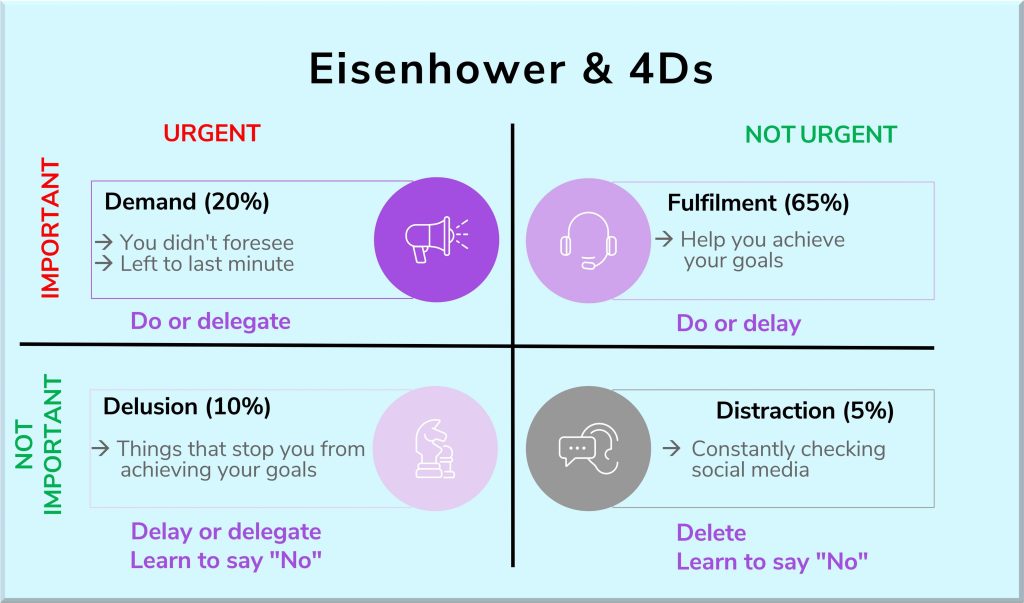
Why doesn’t the Eisenhower matrix work for some people?
Business Coaching
In the whirlwind of today’s demanding business world, mastering productivity is essential for achieving your goals.
You’ve probably heard of the Eisenhower matrix, which helps you manage your time, priorities, and productivity. There you simply divide your daily activities into four categories:
1. urgent and important
2. urgent and not important
3. non-urgent and important
4. non-urgent and not important
Once you’ve made these categorizations, you apply the 4Ds to get the activities done:
1. do
2. delay
3. delegate
4. delete
Tony Robbins went even further and turned these four quadrants into four zones of time management:
1. fulfillment (important and not urgent)
2. demand (urgent and important)
3. delusion (urgent and not important)
4. distraction (not urgent and not important)
He argues that we should prioritize fulfillment activities every day at all costs.
David Allen, the mastermind of productivity, went even further and combined the “old” techniques with modern business and technology in his book Getting Things Done in great detail. If you’re interested in productivity improvement, you should read it.
It all sounds easy and simple, but it doesn’t really work for everyone in practice
Because everyone has a different mindset and approach to productivity. There’s no magic app or spreadsheet that will help you if you don’t sort things out in your head first. Here are three main causes you can identify and eliminate to be more productive and successful:
1. The comfort-craving brain
Our primal instinct for security clashes with the demands of a constantly evolving world. The prefrontal cortex, responsible for planning and goal-setting, battles with the amygdala, which seeks safety and comfort. To overcome this internal conflict, acknowledge the allure of procrastination and its impact on your productivity.
You decide who the winner is by first accepting this “natural call to procrastination” and understanding how it affects your personal organization, success, and well-being.
Then you can have a self-talk about what you want to accomplish. And why it’s important to achieve it.
2. Lack of clarity
If you don’t know exactly what you’re doing for the day, week, or month, that’s a poor starting point for managing your productivity. If you can’t tell your cab driver where you’re going, he can drive you down many streets for hours until you feel like getting out.
That’s why it’s hugely important to do a screening of your day, week, or month to figure out exactly what you’re doing in each section, who the enemies of your productivity are, what you want to do more or less of, etc. Then see where you’re waiting for the cab and what you want to say to the cab driver.
3. Subjective definitions of urgency and importance
Urgent and important are very general words and everyone has a different definition of them. Don’t listen to Tony, David or anyone else defining priorities.
Ask yourself exactly what these words mean to you and write down your own criteria and parameters for urgent and important. Then they will make sense to you, especially if they align with your personal values such as freedom, creativity, inner peace, and the like. If you can think about how your values are fulfilled through all these tasks, you will feel more connected to them.
Once you have gone through these mental processes, you should be able to find your inner drive, logic, enthusiasm and, of course, discipline. Your inner resources will help you develop small new habits and your own work system. Only then will emails, calendars, apps, notes and spreadsheets fully work for your productivity and not the other way around.
You probably won’t like to hear this, but improving your productivity will require a significant investment of time, energy, and probably some money. Another “mental” and real cost. In addition, the productivity story should be compatible with your main goals. But it’s totally worthwhile once you have your own system in place.
If you want to learn more about productivity and improve your business skills, our training on “Manage your time and productivity effectively: Be a high achiever” might be your cup of tea.








